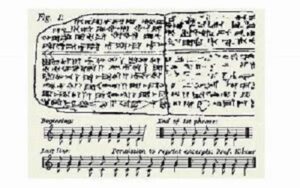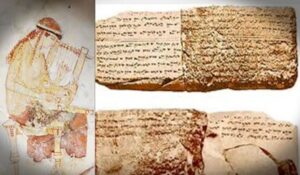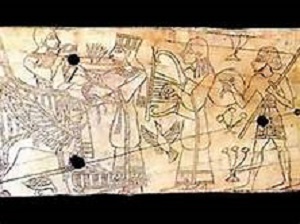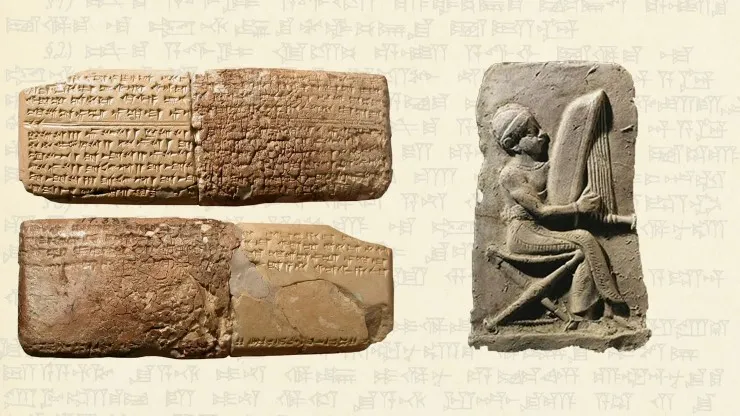The discovery of Hurrian Hymn No. 6, the world’s oldest known melody, is a monumental event in the history of music. Dating back to around 1400 BCE, this ancient piece was found in Ugarit (modern-day Ras Shamra, Syria), an Amorite-Canaanite city. The hymn is part of a collection of 36 songs inscribed in cuneiform on clay tablets, with one tablet containing the complete lyrics of the hymn dedicated to Nikkal, the goddess of orchards.
The Historical Context
The Hurrian Hymn No. 6 is not just a relic; it represents a significant cultural and historical artifact from ancient Syria. The hymn was discovered in the 1950s and has since been a subject of fascination for historians and musicians alike. It provides a glimpse into the musical traditions of the ancient Near East, showcasing the sophisticated musical notation and the cultural importance of music in religious and social contexts.
Modern Interpretations and Performances
 Syrian musicians have made significant efforts to revive and reinterpret this ancient melody. In 2003, musician Raad Khalaf launched the “Ugarit Tablets” project, which included a full translation of the epic of “Anat” and “Baal,” presenting the original manuscript of this Ugaritic melody. The project involved a team of 140 people, highlighting the collaborative effort to bring this ancient music to life.
Syrian musicians have made significant efforts to revive and reinterpret this ancient melody. In 2003, musician Raad Khalaf launched the “Ugarit Tablets” project, which included a full translation of the epic of “Anat” and “Baal,” presenting the original manuscript of this Ugaritic melody. The project involved a team of 140 people, highlighting the collaborative effort to bring this ancient music to life.
Another notable project is “Syrian Rhapsody” (a free-form musical composition that is often emotional and exuberant) by musician Iyad Rimawi, which was part of the Syrian pavilion at Expo 2020 Dubai. This project celebrated the history of choral singing in Syria and featured around 100 Syrian musicians and singers from both inside and outside Syria, under the direction of maestro Misak Baghboudarian.
Solo Performances and Vocal Analysis
Between these large-scale projects, there have been solo performances that have brought a unique touch to the ancient hymn. One such performance was by young Syrian singer Mirai Askar, who performed the hymn as part of the Syrian pavilion at Expo 2020 Dubai. Her rendition was accompanied by instruments reminiscent of those from the Kingdom of Ugarit, such as cymbals, lyres, flutes, drums, and reed instruments similar to the modern oud.
Musicologist Nazih Asaad analyzed Mirai’s performance, noting her clear and smooth vocal delivery, which suited the ancient style that does not require vocal vibrato or ornamentation typical of modern Eastern music. He emphasized the importance of careful handling of the accompanying music, as it provides only a simple harmonic layer, requiring the singer to maintain precise pitch and musicality.
 Mirai Askar’s journey as a musician began at a young age, nurtured by her parents and her involvement in church choirs and the Joy Choir. Her dedication and continuous training led her to perform solo at the age of 12 and to accompany the Joy Choir on a tour in France in 2016. Mirai Askar’s academic background in media from Damascus University, combined with her musical talents, allows her to communicate and share the rich cultural heritage of Syria with a broader audience.
Mirai Askar’s journey as a musician began at a young age, nurtured by her parents and her involvement in church choirs and the Joy Choir. Her dedication and continuous training led her to perform solo at the age of 12 and to accompany the Joy Choir on a tour in France in 2016. Mirai Askar’s academic background in media from Damascus University, combined with her musical talents, allows her to communicate and share the rich cultural heritage of Syria with a broader audience.
International Performances and Recognition
Hurrian Hymn No. 6 has also captured the interest of international audiences and renowned musicians worldwide. One notable performance was by Michael Levy, a British musician known for his work with ancient lyres. His interpretation of the hymn has been widely acclaimed and featured in various documentaries, films, and even video games, introducing this ancient melody to a global audience¹.
In 2017, Syrian-American composer Malek Jandali performed his adaptation of Hurrian Hymn No. 6 at the Aga Khan Museum in Toronto. His rendition, played on a modern Disklavier, brought a contemporary touch to the ancient piece, further showcasing its timeless appeal.
 The hymn is a tribute to Nikkal, the goddess of orchards, and describes her as a nurturing figure that provides for and protects her children. This ancient melody, inscribed in cuneiform, is a testament to the sophisticated musical culture of the Hurrians and their contributions to the history of music.
The hymn is a tribute to Nikkal, the goddess of orchards, and describes her as a nurturing figure that provides for and protects her children. This ancient melody, inscribed in cuneiform, is a testament to the sophisticated musical culture of the Hurrians and their contributions to the history of music.
These international performances highlight the universal resonance of Hurrian Hymn No.6, bridging cultures and eras through the power of music. The hymn’s journey from ancient Ugarit to modern concert halls around the world underscores its enduring significance and the shared human heritage it represents.
The Legacy of Hurrian Hymn No. 6
The Hurrian Hymn No. 6 continues to inspire musicians and researchers, bridging the gap between ancient and modern musical traditions. The story of Hurrian Hymn No. 6 and its modern interpretations is a testament to the enduring power of music and its ability to connect us with our ancient past.
 Lama Alhassanieh
Lama Alhassanieh

